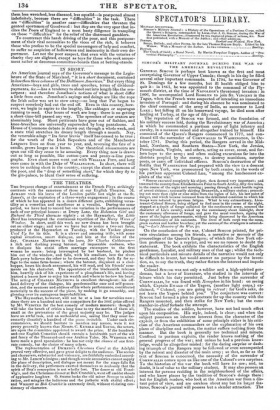THE THEATRES.
THE frequent change of entertainment at the French Plays strikingly contrasts with the sameness of those at our English Theatres. M. ACHARD took his leave of the London public last night at the St. James's, at the expiration of a three-weeks engagement ; in the course of which he has appeared in a dozen different parts, exhibiting versa- tility as a comedian and excellence as a vocalist. During the same period, we have had to record but one variation in the performances of each of our principal houses : at Drury Lane, the Bohemian Girl and Richard the Third alternate nightly ; at the Haymarket, the Little Devil has interrupted the continuous repetition of the Merry Wives of Windsor. In short, until this week no new drama has been brought out on either stage ; and now we have but to notice a two-act farce, produced at the Haymarket on Tuesday, with the Yankee phrase Used Up for its title. It is a clever and amusing trifle, with some capital situations, smart dialogue, and hits at the follies of the day. CHARLES Mai-news is the hero, Sir Charles Coldstream — a rich and dashing young baronet, of impassable coolness, who to dissipate his ennui offers marriage extempore to the first woman he meets : being interrupted by her husband, he pitches him out of the window, and falls, with his assailant, into the river. Each party believes the other to be drowned, and they both fly for re- fuge to the same farm-house ; where the baronet, disguised as a clod- hopper, hears his death announced, his will read, and his friends' com- ments on his character. The appearance of the blacksmith releases him, heartily sick of his experience of a ploughman's life, and having learned a lesson how to enjoy his wealth and where to bestow his heart. The acting of CHARLES MATHEWS is excellent throughout: his off- hand delivery of the dialogue, his gentlemanlike ease and self-posses- sion, and the neatness and address of his whole performance, contributed materially to the success of the piece, by making it go smoothly, and glossing over its outrageous improbabilities. The Haymarket, however, will not be at a loss for novelties now ; since there are a hundred and one competitors for the 500/. prize offered by Mr. WEBSTER for the best comedy of modern manners: though it will take the bench cf critics a long time to try the merits of them all, small as the pretensions of the great majority may be. The judges have an awful task, and an unthankful one, seeing that they must ne- cessarily dissatisfy a hundred of the genus irritabile. Under such cir- cumstances, we should hesitate to mention any names, were it not pretty generally known that Messrs. C. KEMBLE and YOUNG, the actors, are upon the committee appointed to award the prize. If the hundred- and-one Euglish Comedies should contain a hundredth part of the wit and fancy of the Thousand-and-one Arabian Tales, Mr. WEBSTER Will have made a good speculation : he has not only the chance of one first- rate comedy, but the choice of many others. The representation of DICKENS'S Christmas Carol at the Adelphi proved very effective, and gave great delight to the audience. The scenes and characters, substantial and visionary, are faithfully embodied accord- ing to Mr. LEECH'S designs ; and though scenic accessories cannot supply the place of description, and dialogue not meant for the stage falls flat in the delivery, the performers exerted themselves so zealously that the spirit of Boz's conception is not wholly lost. The dance at old Fezzi- wig's, and the Christmas dinner at Bob Cratchit's, went off amidst shouts of applaasive laughter. 0. Smersi looks the old miser Scrooge to admi- ration, and mingles the ludicrous and the pathetic with skilful effect; and WEIGHT as Bob Cratchit is extremely droll, without violating con- sistency of character.


























 Previous page
Previous page